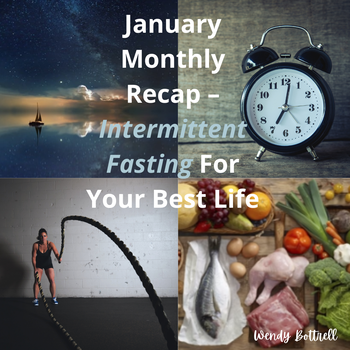 During the month of January, we have written about Intermittent Fasting. Today is our monthly recap just in case you missed one or all of the topics we wrote about this month. We did something a little different this month as well. Our topics included some ideas that might not appear to fit with the Intermittent Fasting topic. Yet, we feel they clearly do. When we write about a topic it is our intention to focus on sharing ideas for your best life. Meaning helping you to think about how you can feel better, be healthier, and be as fit as is possible for your best life. So, this month we included ideas on eating real organic food, discipline and getting out of your comfort zone. To move forward with better health and fitness it is definitely going to take discipline and getting out of your comfort zone. Or at least that has been our experience. Here are the topics we shared this month. Be sure to comment, share and if we can help you please don’t hesitate to get in touch with us. • What Is Intermittent Fasting And How To Begin - https://wendybottrell.weebly.com/blog/what-is-intermittent-fasting-and-how-to-begin • The Many Benefits of Intermittent Fasting For Your Best Life - https://wendybottrell.weebly.com/blog/-the-many-benefits-of-intermittent-fasting-for-your-best-life • A Simple Introduction To Intermittent Fasting - What You Need To Know - https://wendybottrell.weebly.com/blog/a-simple-introduction-to-intermittent-fasting-what-you-need-to-know • The Benefits Of The 16-8 Intermittent Fasting Protocols - https://wendybottrell.weebly.com/blog/the-benefits-of-the-16-8-intermittent-fasting-protocols • Why I Started Intermittent Fasting and The Lessons Learned - https://wendybottrell.weebly.com/blog/why-i-started-intermittent-fasting-and-the-lessons-learned • Simple Ways Intermittent Fasting Benefit Your Workouts - https://wendybottrell.weebly.com/blog/simple-ways-intermittent-fasting-benefit-your-workouts • How to Eat While Intermittent Fasting For Best Results - https://wendybottrell.weebly.com/blog/how-to-eat-while-intermittent-fasting-for-best-results • A Simple Intermittent Fasting Question and Answer Period - https://wendybottrell.weebly.com/blog/a-simple-intermittent-fasting-question-and-answer-period • Avoid Some Of The More Common Intermittent Fasting Mistakes People Make - https://wendybottrell.weebly.com/blog/avoid-some-of-the-more-common-intermittent-fasting-mistakes-people-make • Intermittent Fasting for Women - The Benefits and Hormone Changes - https://wendybottrell.weebly.com/blog/intermittent-fasting-for-women-the-benefits-and-hormone-changes • Be Sure You Are Eating Real Foods For Your Best Life - https://wendybottrell.weebly.com/blog/be-sure-you-are-eating-real-foods-for-your-best-life • Allow Your Discipline to Empower You Each Day - https://wendybottrell.weebly.com/blog/allow-your-discipline-to-empower-you-each-day • 7 Simple Ways To Master Self-Discipline For Your Best Life - https://wendybottrell.weebly.com/blog/7-simple-ways-to-master-self-discipline-for-your-best-life • Get Out Of Your Comfort Zone Today For The Best Life - https://wendybottrell.weebly.com/blog/get-our-of-your-comfort-zone-today-for-the-best-life So, there you have it. A month of Intermittent Fasting topics to help you feel better, think better, move better for your best life. Your feedback is invaluable! We'd love to hear from you! Share your thoughts, ideas, or comments below, and let's continue to inspire each other on our paths to wellness. If you ever need guidance or support, don't hesitate to reach out. We're here to help you thrive every step of the way. Let's Build Health & Fitness - Join Our Newsletter Today! Sign Up Today! https://bit.ly/42Hf0aR Learn more about us at http://wendybottrell.com
0 Comments
Break Free from Your Comfort Zone for a Fulfilling Life Ready to step out of your comfort zone? Discover why it's essential for a fulfilling life and how to overcome the fear of trying new things. Explore the benefits of intermittent fasting and other lifestyle changes to unlock your full potential. We've written about intermittent fasting extensively this month, covering everything from the basics to discipline. But amidst our discussions, it struck me that many might find intermittent fasting daunting, simply because it lies far beyond their comfort zone. I recall feeling hesitant when I first encountered the concept of intermittent fasting in 2019. The discomfort of prolonged fasting and uncertainty about its effects deterred me from trying it. Yet, a realization dawned upon me – our modern lives shield us from discomfort, inhibiting our growth. Attending an event featuring renowned speaker T. Harv Ecker, I was struck by his words: "Nobody ever died of discomfort, yet living in the name of comfort has killed more ideas, opportunities, actions, and growth than anything else. Comfort kills!" Similarly, Thomas Edison emphasized the folly of complacency, urging us to embrace discomfort for progress. So, why is venturing beyond your comfort zone crucial for realizing your aspirations, and why does it seem so daunting? Though humans are wired for comfort and low risk, optimal performance and rewards lie just beyond our comfort zone. By defining and expanding the boundaries of your comfort zone, you unlock new realms of possibility and potential. Experimentation becomes key. Much like my decision to go gluten-free a decade ago, spurred by health concerns, or my foray into intermittent fasting last year due to digestive issues, stepping into the unknown can lead to remarkable transformations. Embrace discomfort, for it's the gateway to growth. Are you ready to challenge your comfort zone? Share your thoughts in the comments below. Here is a recent article we wrote Intermittent Fasting Demystified: A Simple Guide for Weight Loss and Wellness to help you to learn more on Intermittent Fasting and help you get out of your comfort zone today! Your feedback is invaluable! We'd love to hear from you! Share your thoughts, ideas, or comments below, and let's continue to inspire each other on our paths to wellness. If you ever need guidance or support, don't hesitate to reach out. We're here to help you thrive every step of the way. Let's Build Health & Fitness - Join Our Newsletter Today & Recieve The Free Beginners Guide To Healthy Eating! Sign Up Today! https://bit.ly/42Hf0aR Master Self-Discipline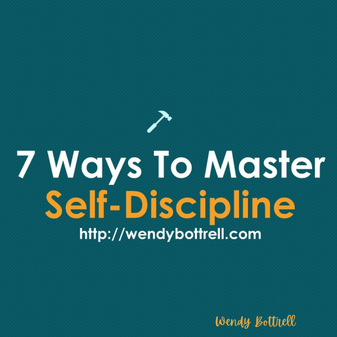 How often have you waited until the first of the week, month, or even year to declare you’re making sweeping life changes, only to fall back into old, familiar patterns just a short while later? If the answer is “plenty,” you’re not alone. New year’s resolutions wouldn’t be such a big deal, otherwise. The good news is that you can get off this pesky rollercoaster of ups and downs, and get your feet on the solid ground of steady progress. All you need is self-discipline. In this article, you’ll learn precisely how. 1- Start With Why You may think self-discipline starts with to-do lists, apps, calendars and planners, but that’s not the first thing you need. The first thing you need to master self-discipline is to know why you’ve chosen your goals. The thing is, superficial reasons often aren’t strong enough to make this stick. You need to identify the deep, emotional causes that resonate in meaningful ways. For example, losing weight just for the sake of being slimmer likely isn’t strong enough to keep you on your diet or in the gym every day. However, when you think about the more significant outcome of losing weight, the pull gets stronger. Is the goal of weight loss to have more self-confidence? To have more energy to spend with your children? Do you want to live longer and eliminate or avoid illness? 2- Delay Gratification (But Lock It In) Second, one of the more significant concepts behind self-discipline is that you increase your ability to delay gratification. When weighing opposing options, you sacrifice short-term benefits for long-term gains. The best way to build self-discipline is to delay gratification, but make sure you plan something enjoyable in the short-term too. For example, if you’re trying to lose weight and you must choose what to eat, you may compromise by following your diet plan correctly all week and allowing a break or cheat meal on the weekend. Or you allow yourself some of the foods you enjoy, stipulating that you prepare them yourself with lighter, healthier ingredients. The key is to make choices that lead to long-term benefit without completely sacrificing your quality of life in the short-term. That way, you make sustainable changes that you can stick to. 3- Reduce Your Options The third method of mastering self-discipline is to simplify your life by reducing your options. Many successful people in the media are known for doing so with their wardrobes – they wear the same types of clothes every day, thereby eliminating confusion on what to wear. You can do the same thing with your diet by stocking your fridge and cabinets with only healthy foods. Remove the temptation to go off plan. When you sit down to work, clean your workspace of anything you don’t need to finish your job. Only make necessities available to you. 4- Visualize The Process Another method that works for building self-discipline is visualizing the steps you’ll take to achieve your goals. If you tend to struggle with waking up early to go to the gym, for example, before you fall asleep at night, envision how you’ll approach the morning. Picture yourself waking up right when your alarm goes off, getting dressed, and heading straight to the gym. Imagine the exact workout you’ll do from start to finish and visualize yourself feeling accomplished, knowing you’ve made the best decision and gotten a great start to your day. 5- Meet Your Baseline Needs It’s much easier to build new habits and exert self-control when you are well-fed, well-rested, hydrated, relaxed, and comfortable in your physical surroundings. As such, make sure you meet your basic needs of healthy food, shelter, drinking enough water, and getting enough rest before you tackle big goals. 6- Change Your Language Next, the way you speak about your goals and priorities can make a huge difference in your approach. If you’re starting a new business, for example, not every aspect will be exciting and motivating. Some things will feel tedious, dull and even downright frustrating. Exercising self-discipline and self-control means pushing through the unpleasant parts to reach your end goal. A trick you can use here is to change the way you discuss these aspects. For example, if you’re dreading a presentation or project at work or school, you have two choices. You can complain about how awful the job is and procrastinate. Or, you can describe how lucky you are to be in your position. If it’s for school, you can think about how fortunate you are to get the chance to advance your education. If it’s for work, you can think of how you get to showcase your knowledge or skills and how great it is that you have a steady paycheck coming in that allows you to pay your bills and enjoy an amount of security in your life. 7- Shift Your Identity Finally, your self-discipline will be much improved if you think of the end goal and align your identity with the type of person who has achieved what you seek. For example, if you want to improve your physical fitness, consider the actions of the physically fit. Reframe your identity and describe yourself as the type of person who cooks healthy food and enjoys physical activity. If you want to have a successful business, examine the traits of successful businesspeople. Adopt some of those traits as you describe your identity. Perhaps you’ve read that the most successful people are early risers. You, too, can shift your self-perception by becoming an early riser. Identify as the type of person who wakes early to work on their business every day. Self-discipline is a combination of identifying your goals and shifting your mindset to prioritize the choices that inch you further toward attaining them, despite your feelings. However, self-control isn’t something you can master overnight. Just like any muscle in your body, self-discipline takes time to build. With practice and effort, you can improve, grow, and become the best version of yourself possible. Your feedback is invaluable! We'd love to hear from you! Share your thoughts, ideas, or comments below, and let's continue to inspire each other on our paths to wellness. If you ever need guidance or support, don't hesitate to reach out. We're here to help you thrive every step of the way. Let's Build Health & Fitness - Join Our Newsletter Today & Receive The FREE Beginners Guide To Healthy Eating! Sign Up Today! https://bit.ly/42Hf0aR Empower Each Day With Discipline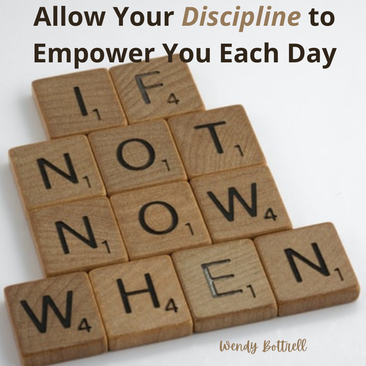 As we continue to discuss intermittent fasting this month, we would like to share some ideas on habits, discipline and finding your inspiration to achieve the health and fitness goals that best suit you for your best life. Our topic today is Allow Your Discipline To Empower You Each Day. Question, do you allow discipline to empower you each day for your best health and fitness lifestyle? It took me a long time to learn the practice of discipline for my best healthy life and as we are discussing intermittent fasting this month it felt like the right time to talk about discipline and habits. This idea of discipline as a practice has been a complete life changer for me. Over the past year, I have developed so many new healthy disciplines and practices one at a time. Each one has been an important piece of the huge positive new disciplines and habits I have been able to achieve. I want to share this important idea with you. Discipline to empower you. “Don’t expect to be motivated every day to get out there and make things happen. You won’t be. Don’t count on motivation. Count on discipline.” - Jocko Willink For years I thought discipline and habits were about lack of freedom, and this is simply wrong. Now, you may think that developing discipline is about limitations. This thought has probably been reinforced by previous attempts at changing your bad habits or at least this is what I thought. Actually, it can be very empowering and freeing to develop the practice of discipline. Think back to when you managed to make a change in behaviour that was successful, how did you feel? When you overcome obstacles in your path and accomplish something with consistent work, you feel like you can do anything. When you are not self-disciplined, you often do not accomplish your goals and feel the struggle, right? You tend to put yourself down more and in general, have a more negative outlook on life. You may set yourself up for health issues, in particular, those related to obesity, fatigue and lack of motivation or maybe you have trouble in your relationships with friends and family. Successful people do not get there just because of luck. They make goals, plan how to achieve them, and then develop the discipline and habits to accomplish those goals and plans. They do fail, they do have obstacles, they may even modify the goals or go in a different direction based on working on those original plans. If you want to succeed, you must have self-discipline. You may want to get rid of bad habits like smoking, inactivity, and overeating. You may want to form good habits such as exercising, eating well, reducing clutter, reading more books, watching less television, or spending more time with family. You can accomplish these new disciplines and habit changes if you focus on one or maybe two at a time, and consistently act on those goals over time. One goal at a time is best, though if you are trying to lose weight, for example, you may think it is better to combine dietary changes with exercise. I disagree with this idea if a person is just getting started along the path of health and fitness. Start exercise first. Don't change how you eat. Get out walking, lifting weights, or another form of exercise that you will do each and every day. Once that becomes a disciplined practice then begin to look at eating well. This might be the best time to consider intermittent fasting. The Person You Can Control – “The only person you can control is you. So focus on making yourself who you want to be: Faster. Stronger. Smarter. More humble. Less ego.” - Jocko Willink The biggest obstacle to discipline is not a lack of willpower, but a desire for instant gratification. Especially in modern society, everything seems to be focused on having things done quickly. People eat instant oatmeal or cold cereal instead of having a cooked breakfast. You grab dinner at a fast-food restaurant instead of home cooking a real food meal. Television commercials tell you that you can have this or that right now if you pay by credit card. The problem with that of course is the interest you later have to pay on those purchases. The same goes for your health and fitness. You can improve things where you are not in debt, are healthy and fit, and have stable relationships, but it will require giving up instant gratification and adopting a self -discipline practice. It will not always be easy, but you will find it empowering to achieve your goals for a better life. Whether you are putting a plan together for your health and fitness discipline is vital to move forward to achieve your desired outcomes. The same goes for the practice of intermittent fasting. You must plan, decide what protocol will be best for you and then discipline yourself to stick to that plan for at least 30 days. Allow Your Discipline to Empower You Each Day, will you? Share your ideas and thoughts below. Your feedback is invaluable! We'd love to hear from you! Share your thoughts, ideas, or comments below, and let's continue to inspire each other on our paths to wellness. If you ever need guidance or support, don't hesitate to reach out. We're here to help you thrive every step of the way. Let's Build Health & Fitness - Join Our Newsletter Today & Receive the FREE Beginners Guide To Healthy Eating! Sign Up Today! https://bit.ly/42Hf0aR Eating Real Organic Food For Your Best Lifestyle We continue to share ideas about intermittent fasting this month. We would be remiss if we didn’t take some time to discuss and share some ideas to help you. Today’s topic is Be Sure You Are Eating Real Foods For Your Best Life. We provided some info for eating both while fasting and not fasting. Here is the link to that article https://wendybottrell.weebly.com/blog/how-to-eat-while-intermittent-fasting-for-best-results and we also wrote about our favourite intermittent fasting method, The Benefits Of The 16-8 Intermittent Fasting Protocols – here is the link to that post - https://wendybottrell.weebly.com/blog/the-benefits-of-the-16-8-intermittent-fasting-protocols We know today that millions of people struggle with chronic health issues. One of the simplest ways to improve a person's health is to change their eating habits. Think about eating real food this way – “Real food doesn't have ingredients; real food is ingredients.” -Jamie Oliver In our opinion, it is so important to think about the food you eat. Remembering that - “The first wealth is health,” American philosopher Ralph Waldo Emerson Real Food is powerful to heal the mind, body and spirit. We must begin to move beyond thinking only of weight loss and think about a healthy and vibrant life through eating real food each and every day. Consider the following to help you through the eating window in the 16-8 intermittent fasting method. Eliminating Sugar Sugar is in nearly every processed food. Various studies indicate that overeating sugar can cause numerous health issues. Eliminating sugar from a person's diet can provide multiple health benefits. Some people notice an improvement in their energy after removing sugar for several days. Although a person may see an initial decrease in energy, most people feel better over time by eliminating processed sugar. A full elimination diet can be hard to follow. As a result, many people have better success by slowly phasing out sugar from their diet. Be Sure To Eat High-Quality Proteins Proteins are made up of amino acids. They are the building blocks of your muscles, organs and every other cell in your body. Having enough protein is especially important after a workout for muscle repair and recovery. Your body can only get the necessary amino acids for health from food. The nine essential amino acids can be found in animal protein sources. For vegetarians, it can be a lot more challenging, so it is our suggestion to consider some high-quality protein. When choosing protein, it is always best to buy the highest quality you can. Pastured is a very good choice for protein and wild-caught fish if possible. Increase Your Intake of Healthy Fats Dietary fat isn't an enemy -- in fact, it's essential to have some fat in your diet for good health. But the type of fat you eat matters, so choose carefully. "Bad" fats include trans fats and hydrogenated oils, which are found in many processed and fried foods. Saturated fat, which is found in many animal foods, isn't bad and consider coconut oil, olive oil or pastured butter. Listen to Your Body Everyone's body is a little bit different. You may not have all the same nutritional needs as someone else who is looking to improve their health and wellbeing. While it's a good idea to follow the general guidelines of healthy eating, you should also talk to your doctor. It's also important to get into the habit of listening to your body and noticing how certain foods make you feel. If you notice that certain foods make your symptoms flare up (or leave you feeling great), you can adjust your diet accordingly. Keeping a food journal can help you track how particular foods affect your health and well-being. And be sure to stick with real food, organic is always best if possible, cooked by you in your own kitchen is priceless. "Clean, tasty, real foods do not come processed in boxes or bags; they come from the earth, the sea, the field, or the farm." - Suzanne Somers Your feedback is invaluable! We'd love to hear from you! Share your thoughts, ideas, or comments below, and let's continue to inspire each other on our paths to wellness. If you ever need guidance or support, don't hesitate to reach out. We're here to help you thrive every step of the way. Let's Build Health & Fitness - Join Our Newsletter Today & Receive the FREE Beginners Guide To Healthy Eating! Sign Up Today! https://bit.ly/42Hf0aR Intermittent Fasting For Women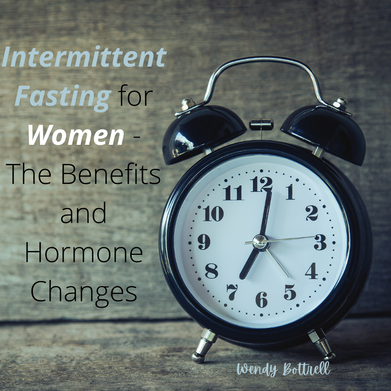 We have been writing about intermittent fasting this month and today thought we would focus on Intermittent Fasting for Women - The Benefits and Hormone Changes. There are differences for women with Intermittent fasting. I am including an article from Dr. Axe’s website that might be of interest to you for more information. Learn more about the challenges of Intermittent fasting for women and the idea of Crescendo Fasting for Women https://draxe.com/nutrition/intermittent-fasting-women/ Intermittent fasting, in general, is safe for everyone to do, as long as they are an adult and don’t have major health complications. However, if you are a woman, you might want to think before you begin. While many women experience no negative side effects, there are some things to consider first. Here is what you should know about intermittent fasting as a woman. The Benefits of Intermittent Fasting First of all, it helps to know the benefits of intermittent fast, not just for women but for everyone. There are many reasons people try IF for health and weight loss. It can help increase your body’s fat-burning potential since the food you eat is burned rather quickly during your fasted state, after which you start burning fat. Because of this, it can also help to increase your energy and cognitive function. Some people notice a reduction in blood pressure and cholesterol, as well as more balanced blood sugar levels. Hormonal Changes While there are a few different side effects of doing intermittent fasting, the hormonal changes women sometimes experience tend to be the most worrisome. Many women can do IF and not have any issues, but those who do show signs of hormonal changes might need to consult their doctor and possibly switch protocols or stop intermittent fasting altogether. The hormonal imbalance is often from not doing intermittent fasting correctly, which is good news. It means as long as you follow your protocol, there is a good chance you won’t have these problems. If your body senses starvation by going too long without food, your hormones may increase, thus creating an imbalance. This is why it is important to only stick to the number of hours you are meant to fast, and not go over it by too much. Signs of a Hormonal Imbalance As with everything when it comes to your health and wellbeing, make sure you are paying close attention to your body when you do intermittent fasting so that you know if and when you have hormonal changes. Some signs of having a hormonal imbalance include bloating, irregular periods or bleeding in the middle of your cycle, fatigue, and even depression. If this is happening to you, talk to a doctor and let them know you have started intermittent fasting. They might recommend either stopping it completely or switching up your protocol or diet. Your health must always be a top priority, so don’t ignore those hormonal balance symptoms. Again, be sure to check out the challenges of Intermittent fasting for women and the idea of Crescendo Fasting for Women by Dr. Axe here: https://draxe.com/nutrition/intermittent-fasting-women/ Your feedback is invaluable! We'd love to hear from you! Share your thoughts, ideas, or comments below, and let's continue to inspire each other on our paths to wellness. If you ever need guidance or support, don't hesitate to reach out. We're here to help you thrive every step of the way. Let's Build Health & Fitness - Join Our Newsletter Today & Receive the FREE Beginners Guide To Healthy Eating! Sign Up Today! https://bit.ly/42Hf0aR Common Intermittent Fasting Mistakes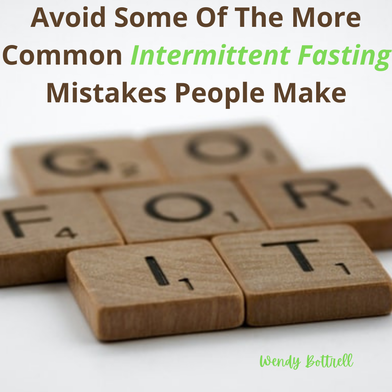 In our conversation on Intermittent Fasting, we must share some ideas to avoid some of the more common Intermittent fasting mistakes people make. Taking in some of these simple ideas will help you gain the benefits of intermittent fasting while avoiding the challenges some people make that might slow them down. You now may be at the point where you have decided to begin the practice of IF. Before you get started with intermittent fasting, it helps to have a better understanding of how it works, and what you should or should not do. We wrote a post on How to Eat While Intermittent Fasting For Best Results here - https://wendybottrell.weebly.com/blog/how-to-eat-while-intermittent-fasting-for-best-results The following list includes some common do’s and don’ts that are bound to come up, allowing you to avoid some of the more common mistakes people make. Do: Transition Slowly Make sure you are not going into intermittent fasting without planning ahead of time, and without really researching different protocols. You might want to transition into it slowly, such as doing the 16/8 protocol a couple of days a week instead of every day, or trying to fast just 12 hours at first, then gradually working your way up to 16 hours. This is exactly what I did. I started with 12 hours because I did not want to feel stressed about fasting. I wanted to have some immediate WINS, see how I felt and then move forward successfully to a 16-hour window. It worked out well for me. I felt like I challenged myself and yet I didn’t feel stressed at all. So, in my opinion, I would highly suggest transitioning slowly so you can have the WINS for yourself and feel good about this practice. Don’t: Make Yourself Uncomfortable Intermittent fasting can be hard on your body at first, especially if you are used to eating 6-8 small meals throughout the day. This is another reason why you might do better transitioning to eating fewer meals during the day, then switching up the hours so you are following an intermittent fasting regimen. If you feel like you are faint from going too long without eating, then it is time to re-think the protocol you are following for IF. This idea is really about paying attention to what your lifestyle habits have been and how you want to move forward. Small changes made over time will take you further than drastic changes that are not sustainable to success in a new habit. Do: Listen to Your Body You also want to listen to your body when you start intermittent fasting. You may try a protocol that simply isn’t working for you, so it shouldn’t be forced. While you do want to give each protocol a good amount of time to find out if it is a good fit, don’t go months being uncomfortable and miserable on a particular IF protocol. You may just need to accept the fact that it isn’t a good one for you. Don’t: Start Binge Eating This is one of the bigger mistakes people make when they first start intermittent fasting. You might find that during the short window when you can eat, all you want to do is binge eat and go for anything you can get your hands on. This is the absolute wrong way to fast. Intermittent fasting is not meant to encourage unhealthy eating habits. You MUST eat the same healthy real foods you normally would, only during a shorter window. Do: Stay Hydrated While Fasting Make sure you are staying hydrated while you are fasting. People often forget to drink water just because they are fasting. During the fasting window, the ideal beverages are water, coffee and tea. It is suggested to have black coffee and tea however a bit of creamer in coffee goes a long way for the enjoyment. Don’t: Watch the Clock While you do want to be sure you are waiting for the appropriate amount of time while fasting, don’t let it take over your life. You want to develop a different mindset with food and how often you should eat, so try to just set a timer on your phone when it’s time to eat again. As you practice fasting in my experience it becomes much easier to not focus on eating. In fact, when I go for a hike in the forest, I rarely even remember I haven’t eaten. Out on the trails or walking in the neighbourhood, I go fasted and this goes for so many activities in daily life. Your feedback is invaluable! We'd love to hear from you! Share your thoughts, ideas, or comments below, and let's continue to inspire each other on our paths to wellness. If you ever need guidance or support, don't hesitate to reach out. We're here to help you thrive every step of the way. Let's Build Health & Fitness - Join Our Newsletter Today & Receive the FREE Beginners Guide To Healthy Eating! Sign Up Today! https://bit.ly/42Hf0aR 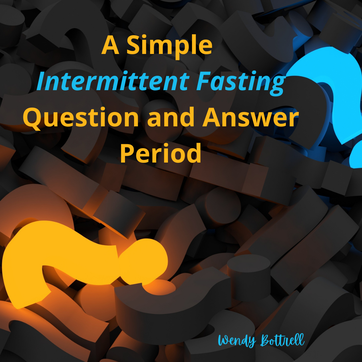 We have been discussing Intermittent Fasting this month and today we are simply sharing some questions that come up regularly on the topic. So, today's post is an Intermittent Fasting Question and Answer post. Let us know what we missed. The best of all medicines are rest and fasting. ~Benjamin Franklin What is Intermittent Fasting? It is an eating regimen that dictates periods of fasting between eating. The fasts could be certain hours a day or up to 32 hours in a row, once or twice a week. This type of fasting has shown positive health benefits in animal studies. Source: http://en.wikipedia.org/wiki/Intermittent_fasting Did you know? Intermittent fasting has been the subject of scientific study in rats since 1943. It is also known as alternate day fasting (ADF), every other day fasting (EOD), or every other day feeding (EODF). The results from these early testings showed an increased life span in rats subjected to intermittent fasting regimens. Source: http://en.wikipedia.org/wiki/Intermittent_fasting Is fasting good for you? Modern scientific studies have also shown that Intermittent Fasting (IF) is in fact as good or better than continuous calorie restriction with increased health benefits. It is also generally easier for people to restrict their intake to a few hours a day than be able to restrict their calorie intake every time they eat. Source: http://healthimpactnews.com/2013/what-the-science-says-about-intermittent-fasting/ Increase your ability to lose weight without losing muscle mass through Intermittent Fasting. New studies prove that IF increases production of Human Growth Hormone (HGH) that allows the body to rev up its metabolism while at the same time promoting muscle growth. Source: http://healthimpactnews.com/2013/what-the-science-says-about-intermittent-fasting/ What are other benefits of Intermittent Fasting? Normalizing your insulin and leptin sensitivity has been proven to help prevent the largest category of killer diseases in humans: heart disease, diabetes and even cancer. It also normalizes your ‘hunger hormone’, ghrelin; making losing weight easier on this fasting regimen. Source: http://fitness.mercola.com/sites/fitness/archive/2013/01/18/intermittent-fasting-approach.aspx Keep your brain healthy by fasting intermittently! In a recent study, the process of IF actually promotes an increase in a protein that promotes neural brain health and helps to prevent the onset of Alzheimer’s and Parkinson’s disease. The study in rats would equate a delay of up to 20 years in humans. Source: http://fitness.mercola.com/sites/fitness/archive/2013/01/18/intermittent-fasting-approach.aspx Starvation? This is not what intermittent fasting is about. Recent studies have also found that the body does not start true ‘starvation’ mode survival until about 72 hours of fasting, whereby the breakdown of proteins starts in earnest to feed the body, most of which at this point is muscle proteins. IF is periodic or every other day fasting and does not produce the same harmful effects. Plan your fasting to avoid these pitfalls. Source: http://www.muscleforlife.com/the-definitive-guide-to-intermittent-fasting/ Are you exercising regularly and still having trouble losing those few extra pounds? It may be time to start Intermittent Fasting during, before and after your workouts to ensure fat loss during your exercise regime. It has been proven in a recent study that fasting and working out can actually enhance the amount of fat loss. Source: http://www.muscleforlife.com/the-definitive-guide-to-intermittent-fasting/ Is breakfast the most important meal of the day? Evidence seems to support this fact mostly. Its mostly correct, because the body gains larger health benefits by eating a carb heavy meal directly after a fasting period due to insulin sensitivity. However, if you extend your overnight fast (sleeping) until after your workout, which also depletes insulin, when you do eat your first meal it will compound those benefits. In other words, a regular meal directly after 8, 12, or 24 hours of fasting is a health benefit. Source: http://ca.askmen.com/sports/foodcourt_700/703_intermittent-fasting.html Shouldn’t you eat smaller, more often? This has been the wisdom of the day for so long that most people take it as a guaranteed fact. However, it has never been scientifically proven that 6 small meals a day are beneficial over 2-3 regular meals. Furthermore, this constant feeding mechanism has been proven and linked to over-eating because of never feeling satiated. Since you are encouraged to eat your mind thinks you need to eat more often, which usually leads to higher caloric intake and weight gain. Source: http://ca.askmen.com/sports/foodcourt_700/703b_intermittent-fasting.html Your feedback is invaluable! We'd love to hear from you! Share your thoughts, ideas, or comments below, and let's continue to inspire each other on our paths to wellness. If you ever need guidance or support, don't hesitate to reach out. We're here to help you thrive every step of the way. Let's Build Health & Fitness - Join Our Newsletter Today & Receive the FREE Beginners Guide To Healthy Eating! Sign Up Today! https://bit.ly/42Hf0aR Unlock The Benefits Of Intermittent Fasting Tips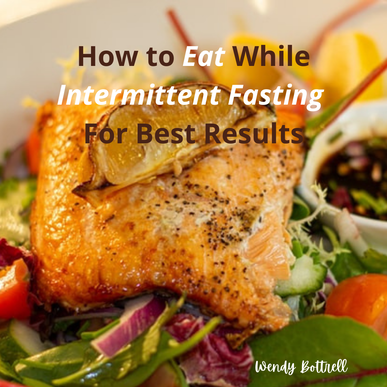 During our Intermittent Fasting month, we have shared a number of ideas on this topic. What is IF, how to get started, IF and Workouts and more. Today we will share some ideas on how to eat while intermittent fasting for the best results. If you have been following along this month you will already know that Intermittent fasting, is a type of eating pattern where you go through phases of eating and not eating. Not only do you need to know what you can have during the fasted state, but also how and when to eat when the eating period begins. Today’s post is going to provide you with info for eating both while fasting and not fasting. Don’t Overindulge This might seem obvious however one of the biggest mistakes people make when following intermittent fasting is that they are counting the hours until they can eat, then they will overeat. The point is not to starve yourself for 20 hours just so you can binge eat for 4 hours. You want to stick to your normal diet during the eating window. We believe in making food choices that are real organic foods so be sure to stick to nutrient-dense meals. Definitely avoid the processed, fast food junk food. You want that food to fuel your body and sustain you for the next fasting phase. Read more on IF here - https://www.dietdoctor.com/intermittent-fasting Choose These Beverages – An everyday approach If you are just starting out with intermittent fasting, you might not know exactly what “fasting” entails. This does not mean you have absolutely nothing during the fasting window. Instead, you want to stay hydrated, so make sure you have plenty of water. You can also have beverages like tea and coffee. Just be careful about what you add to your coffee. Some people allow themselves a splash of creamer in their coffee since the calories are still extremely low, but try not to depend on that. This is the perfect time to begin to eliminate unnecessary sugary drinks, like soda, juice, energy drinks. There is no value for your health and wellbeing in these drinks. It might take some practice however it is worth it to begin the habit of not including these types of drinks in your daily intake. Stick to a Healthy Real Organic Food Diet Many people make the mistake of using intermittent fasting as an excuse to eat what they want, then fast, assuming it will balance out and they won’t gain weight. This is the absolute wrong mindset to have, plus, you aren’t going to gain all the wonderful benefits of intermittent fasting if you choose this method. When you are eating after fasting, ease into it slowly, starting with a normal-sized, real organic food meal. Your meals during a shorter eating window must be as nutritious as possible, with lots of vitamins and minerals. Think protein, fruits and veggies, nuts, and seeds. Not everyone can tolerate nuts and seeds so be aware and proceed according to how you feel. You may have one or two larger meals, but if you have gone 16-18 hours without a meal, you don’t want that first meal to be riddled with preservatives, sugar, and processed ingredients. Truly there is no benefit to this eating practice. Your feedback is invaluable! We'd love to hear from you! Share your thoughts, ideas, or comments below, and let's continue to inspire each other on our paths to wellness. If you ever need guidance or support, don't hesitate to reach out. We're here to help you thrive every step of the way. Let's Build Health & Fitness - Join Our Newsletter Today & Receive the FREE Beginners Guide To Healthy Eating! Sign Up Today! https://bit.ly/42Hf0aR Learn more about us at http://wendybottrell.com Intermittent Fasting and Workouts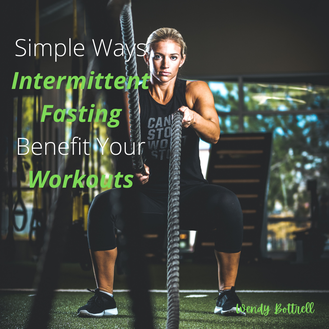 Last month we wrote about fitness and working out and this month we are discussing intermittent fasting. Today we put these two health practices together and share ideas on Simple Ways Intermittent Fasting Benefit Your Workouts. Figuring out when to workout and the types of workouts for many people that be a challenge. Now we want to share how to workout while intermittent fasting knowing this is probably in the top 3 most commonly asked questions. In short, you can definitely still do your regular workouts while doing intermittent fasting, it just might take a little tweaking as far as when you workout, including if you should do your regular routine while fasting or during the eating periods. Do Your Workouts Before Eating Generally speaking, you want to try to schedule your workouts for shortly before you are going to start your eating phase. Of course, this may vary based on the type of workout you do and the duration of the fast. The intensity of your workouts can also make a big difference. Some people who have extremely intense workout routines, like CrossFit, find that they need the boost in protein and carbs prior to a workout. If this is the case, you may be someone who will want to do your workouts during your eating phase and not your fasting phase. Cardio Workout Tip There is some research to show that if you exercise while fasting, there are additional benefits. There is an impact on your metabolism and muscle biochemistry. This is linked to your insulin sensitivity and blood sugar level. If you exercise while fasting, your glycogen (or stored carbs) is depleted. This means you’ll burn more fat. To get the best result, eat protein following your workout. This will build and maintain muscles. It will also promote better recovery. You can also follow up strength training with some carbs within a half-hour of your workout. It’s wise to eat food close to any modern or high-intensity exercise session. You must also drink more water to stay well-hydrated. Keeping up your electrolyte level is important. Coconut water can be useful for this. If you’re doing a longer fast, you may find gentle exercises like pilates, yoga or walking are better. They will help to burn fat without making you feel unwell. It’s important to listen to your body. Consider that you may want to end your fasting window straight after exercising. High-intensity cardio, like running or HIIT, can be a little hard on your body when you haven’t been eating for a prolonged period of time. I have found that I do my walking while still fasting and will only consider a run, sprints or a HIIT workout fasted if I feel really great and not more than twice a week. ther than that, I do my resistance training after I am have eaten to feel my best and have a good workout. Benefits of Fasted Workouts There are a few reasons to try and schedule your workouts during the fasted periods, as long as you aren’t feeling sick or faint. They include: Burning more fat – Intermittent fasting is already helping you to burn more fat, so why not increase it a little bit? You might be able to increase how much fat you burn just by doing your workouts while you are fasting. Helping with indigestion – Exercising while fasting can also help with digestion issues. Many people find that eating shortly before or after a workout makes it harder to digest, leading to a variety of stomach problems. Decreasing hunger – Fasted periods can be hard to handle, especially if you are accustomed to eating every few hours. One great way to decrease hunger pangs is to workout in the middle of the fasted stage. This helps prevent you from eating when you’re fasting, at least this has been my experience. Your feedback is invaluable! We'd love to hear from you! Share your thoughts, ideas, or comments below, and let's continue to inspire each other on our paths to wellness. If you ever need guidance or support, don't hesitate to reach out. We're here to help you thrive every step of the way. Let's Build Health & Fitness - Join Our Newsletter Today & Receive the FREE Beginners Guide To Healthy Eating! Sign Up Today! https://bit.ly/42Hf0aR Intermittent Fasting Lessons Learned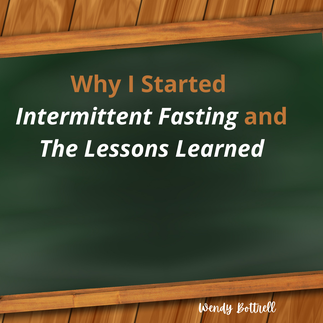 Over the past week, I have written on the topic of intermittent fasting. I have shared blog posts on • What Is Intermittent Fasting And How To Begin - https://wendybottrell.weebly.com/blog/what-is-intermittent-fasting-and-how-to-begin • The Many Benefits of Intermittent Fasting For Your Best Life - https://wendybottrell.weebly.com/blog/-the-many-benefits-of-intermittent-fasting-for-your-best-life • A Simple Introduction To Intermittent Fasting - What You Need To know - https://wendybottrell.weebly.com/blog/a-simple-introduction-to-intermittent-fasting-what-you-need-to-know • The Benefits Of The 16-8 Intermittent Fasting Protocols - https://wendybottrell.weebly.com/blog/the-benefits-of-the-16-8-intermittent-fasting-protocols Today I would like to share the lessons I have learned so far on this journey. I began experimenting with Intermittent Fasting at the start of 2020. This practice is something I had heard about for quite a while, attended an online Summit on IF and was intrigued by the idea. Yet it made me uncomfortable “trying” to go without eating. Weird, right? The idea of being hungry made me feel uneasy and not something I wanted to commit to. So, I put it off. Then one day I was listening to Wim Hof, The Ice Man and he said something that changed everything for me. This is not a direct quote however his message was that day that today’s human is not tough enough. We live too easily. Modern human beings are never really cold, or really hot, or really hungry, or we don’t push ourselves outside of our comfort zones anymore.
I took some time to think if this was true for me. I have been willing to experiment with so many ideas over the past 20 years in my health and fitness journey, yet I wasn't willing to experiment with Fasting. You see I had already started to do cold showers; I was doing Wim Hof breathing method, training hard and so much more. Yet, I wasn’t willing to at least give Intermittent Fasting a try. I didn’t want to feel uncomfortable with feeling hungry. It made me realize I had to toughen myself up. I decided I was going to begin a 30-day experiment with Intermittent Fasting. That experiment has turned into a year of practicing fasting. Learning about myself and today I would like to share some of the lessons I have learned. The first thing I learned about myself is that I must always be willing to do those things that make me uncomfortable. This is what makes me stronger and willing to do more in my life. I began my experiment into IF and it has been great. What I was extremely uncomfortable and resistant to in the beginning has turned out to be a great gift. Not only am I fasting most days of the week now doing the 16-8 protocol I have been able to push myself a couple of times to do a fast over 30 hours which is something I never thought I would be able to accomplish. I allowed myself to be persistent in the area of doing something new without knowing how it would turn out for me and I have had some huge WINS. I feel better, I have reduced my weight, I have more energy, and continue to practice Intermittent Fasting a year into this experiment. The learning here is never underestimating what I am capable of and it seems this might be the same for you. We are all tougher and able to do more than we think. We just have to give ourselves the opportunity to experiment and practice. I never thought I would be able to exercise in a fasted state. Another thing that I have learned was not true for me. Each morning I go out for my walk fasted and it feels great. Now I even go out for 10 – 15 km hikes in the forest in a fasted state. When I began going out on longer hikes fasted, I did bring something to eat just in case and I realized I didn’t trust myself enough to know I can do what I put my mind to. No problem. Feels great. You’ve heard the quote “Whatever Your Mind Can Conceive and Believe, It Can Achieve.” – Napoleon Hill. This is the big lesson I learned from my experience of beginning the practice of Intermittent Fasting. The important lesson here is I can do more with my health and fitness when I believe it and take action, I can accomplish anything. When it comes to health and fitness mindset matters for our best life. Your feedback is invaluable! We'd love to hear from you! Share your thoughts, ideas, or comments below, and let's continue to inspire each other on our paths to wellness. If you ever need guidance or support, don't hesitate to reach out. We're here to help you thrive every step of the way. Let's Build Health & Fitness - Join Our Newsletter Today & Receive the FREE Beginners Guide To Healthy Eating! Sign Up Today! https://bit.ly/42Hf0aR The 16-8 Intermittent Fasting Protocol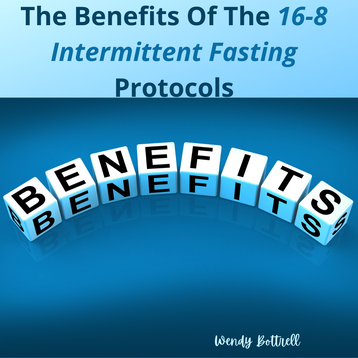 Our conversation today will include the benefits of the 16-8 intermittent fasting protocol. This is how we have chosen to practice IF for the past year. It has been simple to do because we just calculate the time between dinner and the first meal for the following day. Yesterday we wrote on A Simple Introduction To Intermittent Fasting - What You Need To know https://wendybottrell.weebly.com/blog/a-simple-introduction-to-intermittent-fasting-what-you-need-to-know Check out the benefits of this fasting protocol When we began this practice last year we heard this - If there was one intermittent fasting protocol that most people tend to try first, it is probably the 16-8 protocol. Also called Lean Gains, the 16-8 fasting protocol is good for beginners because you don’t go as long in between eating periods. Many people struggle with IF which requires going 24 hours or longer without eating or drinking anything, so this can be a good one to start with. Benefits of the 16-8 Protocol Ease of following this protocol is one of the main benefits. You aren’t having to go 24 hours between meals, which can be very hard for some people. This is what is involved in the Warrior Diet or the Eat-Stop-Eat method of intermittent fasting. With the LeanGains, or 16-8, you are only going 16 hours without eating. Keep in mind a lot of this is while you are sleeping, so there are just a few hours in the morning and a few hours in the evening where you are not eating while awake. You can also reduce your hunger as your body becomes accustomed to the protocol, and burn all the stubborn fat your body has been holding onto. Don’t forget the convenience of only eating 8 hours out of the day, instead of trying to plan and schedule meals every few hours. Here is some additional good information and ideas for the 16-8 protocol from Mindbodygreen.com - https://www.mindbodygreen.com/articles/16-8-intermittent-fasting-schedule How to do the 16-8 Protocol This is one of the simplest intermittent fasting protocols, which is why it also happens to be one of the most popular. If you think about it, going 16 hours without eating really isn’t a huge stretch. Think about the weekends when you plan to go to brunch at lunchtime; you probably don’t’ eat until noon or 1 in the afternoon. Depending on when you ate the night before, this might easily be 16 hours later or longer. Y ou just need to schedule your meals accordingly so that you eat for 8 hours, then fast for the next 16, and repeat. Tips for Doing the 16-8 Fasting Protocol If you’re new to intermittent fasting or just this protocol, here are some tips that can help: Consider fasting more in the morning – With an 8-hour eating window, you can choose to schedule it during any time, then fast for the following 16 hours. If you tend to munch at night or like going out with friends in the evenings, you might be better off starting fasting late, then skipping breakfast and eating a late lunch the following day. Skip all calories – While you should definitely have water during the fasting hours, and you can have coffee and tea, skip everything with calories. This includes creamer in your coffee and Bulletproof coffee. If you are feeling faint or ill, or just like flavoured coffee, a little creamer or cup of broth won’t hurt you, but it really is better to stick to no calories. Make sure you give your body time to adjust. The 16 hours of fasting might be difficult for the first few days, but you will get used to it. Soon, you won’t even get hungry until those eating windows. Now, when I first started the practice of fasting, I didn’t want to feel so stressed about the beginning. I made the choice in the beginning if I felt really hunger, I would push myself to do the 16 hours fast, however, if I got feeling too stressed, I would eat. And I would then begin to notice why I was feeling especially hungry on that day. Was I more stressed? How was my sleep? What did I have for dinner? This helped me stick with the fasting protocol in the beginning. A year later I have noticed that I don’t even think about eating first thing in the morning now. I go out for my walk each morning fasted and it feels good. Most days I just walk however there are a couple of days a week where I might do some short spurt runs over my hour walk. But when you are starting Intermittent fasting practice. Start with 12 hours and work up to 16 hours. The benefits will come in the consistent practice of intermittent fasting, at least this has been my experience. Your feedback is invaluable! We'd love to hear from you! Share your thoughts, ideas, or comments below, and let's continue to inspire each other on our paths to wellness. If you ever need guidance or support, don't hesitate to reach out. We're here to help you thrive every step of the way. Let's Build Health & Fitness - Join Our Newsletter Today & Receive the FREE Beginners Guide To Healthy Eating! Sign Up Today! https://bit.ly/42Hf0aR What You Need To Know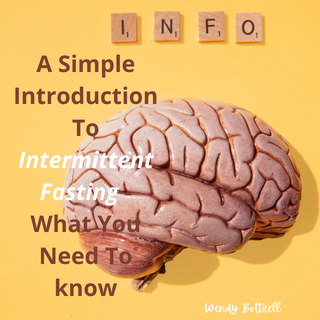 This month we are sharing ideas about Intermittent Fasting for your best life. Today’s topic is a simple introduction to intermittent fasting – what you need to know. We have shared over the past few days our year-long experiment with Intermittent Fasting and how it has helped me to feel better, have more energy as well as reducing my weight which was not something I had even considered when I began. You have probably heard of intermittent fasting, right? This is being mentioned everywhere, from social media sites to health TV shows. If you read a weight loss, fitness, or health blog, you will most likely see it mentioned often there as well. Intermittent fasting is a new way of eating that promotes weight loss, fat burning, muscle building, and many other health benefits through a very simple eating pattern. Here is more information about intermittent fasting so that you can decide if it is a good option for you. IF is a Pattern of Eating Many people call intermittent fasting a diet, but it is rather a pattern of eating or dieting for optimal success. It teaches you a lot, including how to listen to your body’s hunger signals, and to follow a healthy pattern of eating. ou are following a specific pattern each day, where you only eat during a shorter block of time, fasting for the rest of the day, except for having coffee, tea, and water. This pattern helps your body to burn food more quickly so that there is more time for burning fat. There are Different Protocols The next thing you will learn about intermittent fasting is that there isn’t just one way to do it, but several methods or protocols to choose from. It is very flexible, so you can look at the different methods and choose which one works best for your schedule and your lifestyle. Here are some popular IF protocols people like to turn to: 16:8/Lean Gains – This is a popular option, allowing you to eat for 8 hours, then fast for 16 hours. You try to do it as often as possible. It is suggested to plan for 5-6 days a week. 5:2 – The 5:2 diet requires you to eat how you normally would 5 days out of the week, then have 2 alternating days of the week where you fast for 24 hours. You can often have a low amount of calories on fasted days, up to 500-600 calories. Warrior Diet – With the warrior diet, you go 24 hours between eating, having just one large meal at the end of every fasted day. Eat-Stop-Eat/24-Hour – This is similar to 5:2, except you may only go 24 hours once a week. You also don’t have the calories, but a full fasting day with only water, coffee, or tea. Unlike other types of dieting, IF allows dieters to eat pretty much what they want. They can eat the sugary or fatty foods they crave. They can go out to eat and not worry about calorie counting. They don’t have to eat foods they don’t enjoy. They don’t have to feel as if they’re depriving themselves of the things they love. It’s easy to see why it’s such a popular choice. Not only that, but intermittent fasting offers many more benefits than other types of diet. Yes, it promotes rapid weight loss. However, it also helps dieters to feel more focused and be more productive. Tips for Starting Intermittent Fasting Here are a few quick tips that can make this transition easier for you:
Your feedback is invaluable! We'd love to hear from you! Share your thoughts, ideas, or comments below, and let's continue to inspire each other on our paths to wellness. If you ever need guidance or support, don't hesitate to reach out. We're here to help you thrive every step of the way. Let's Build Health & Fitness - Join Our Newsletter Today & Receive the FREE Beginners Guide To Healthy Eating! Sign Up Today! https://bit.ly/42Hf0aR Benefits of Intermittent Fasting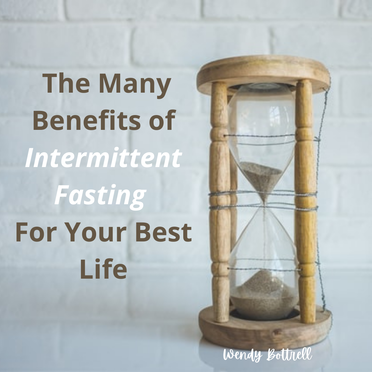 As we continue to share ideas for Intermittent Fasting (or IF for short) today’s topic is the many benefits of Intermittent Fasting for your best life. Our first blog post is here - https://wendybottrell.weebly.com/blog/what-is-intermittent-fasting-and-how-to-begin "Periodic fasting can help clear up the mind and strengthen the body and the spirit." ~Ezra Taft Benson We know today that Intermittent fasting is a growing topic in the health and weight loss communities, but why? Simply put – it works. Many people are finding a long list of benefits to this form of fasting, and not just those looking to lose weight. While that is definitely one of the top advantages, you will find many other health benefits as well. It is a Simpler Way to Lose Weight If you have ever attempted to lose weight you have most likely experienced what is called yo-yo dieting, right? Well, Yo-yo dieting is not only not conducive to successful weight loss, but it can actually be harmful to your body. Here is a link to consider why this kind of dieting is harmful to your body - https://www.npr.org/sections/health-shots/2017/05/01/526048767/-yo-yo-dieting-poses-serious-risks-for-heart-patients# Too many changes in short periods of time can lead to many issues with digestion, weight gain, and abdominal pain, so you want to stick to one method and keep with it. The reason why so many people are having success with intermittent fasting is because of how simple it is. You just have to pick one method of intermittent fasting and stick with it, eating healthy real foods and moderately during the eating periods, and fasting during the other hours of the day. It really doesn’t get much easier than that. This has been my experience over the past year. I decided to follow the 16-18 hour fast method for 5-6 days a week and it has been amazing. Simple to do and my weight has been reduced to 2 waist sizes without even thinking about weight loss when I started this practice. I was hoping to feel better, have more energy. I have experienced all those and weight reduction. It Can Help With Blood Sugar Control Moving beyond helping you to lose weight or burn fat, intermittent fasting it also efficient at controlling your blood sugar levels. When you do intermittent fasting over a prolonged period of time, and do it the right way, you can start increasing your insulin resistance and lowering your blood glucose levels naturally. When you do this, you just might help to treat your type 2 diabetes or avoid diabetes if you were in the high-risk category. More on this here - https://www.healthline.com/nutrition/10-health-benefits-of-intermittent-fasting#TOC_TITLE_HDR_2 You Can Increase Cognitive Function There have been animal studies on intermittent fasting and how it can have a positive effect on your cognitive health, which helps to promote brain and memory health. You can actually reduce your risk for brain-related illnesses like dementia and Alzheimer’s disease with both a healthy diet and diets like intermittent fasting. Studies were performed at the Laboratory of Neurosciences at the National Institute of Aging on this very subject. It Promotes Healthy Eating Since intermittent fasting takes away overeating and requires you to really be conscious when you do eat, it can help tremendously with your overall health. Nutritious real organic foods provide so many amazing health benefits, for your weight, heart health, cholesterol, even your bones. With intermittent fasting, you try to have nutrient-dense foods during eating phases, so it can help you to learn to eat better overall. Your feedback is invaluable! We'd love to hear from you! Share your thoughts, ideas, or comments below, and let's continue to inspire each other on our paths to wellness. If you ever need guidance or support, don't hesitate to reach out. We're here to help you thrive every step of the way. Let's Build Health & Fitness - Join Our Newsletter Today & Receive the FREE Beginners Guide To Healthy Eating! Sign Up Today! https://bit.ly/42Hf0aR Intermittent Fasting Month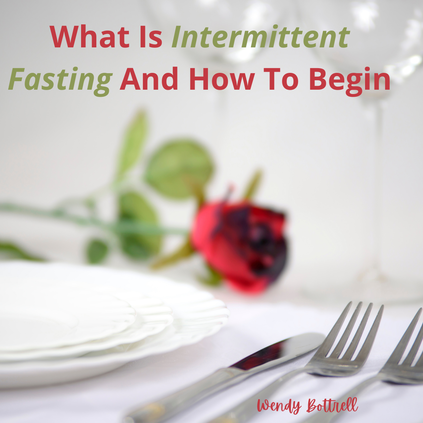 This month we are sharing ideas and information on Intermittent Fasting. This is something we decided to experiment with during 2020. We are definitely glad we did, and we are only sharing our ideas on this topic here, and each of you must consider for yourself if this is something you will want to practice. As we all know 2020 was a stressful year and we thought giving fasting a chance might be a way to help reduce some stress for our mind, body and spirit. We had no idea how this was going to go and that was a part of the plan.
Now, I wasn’t overweight, yet I was carrying more weight than I wanted to. What I can share with you after a year of practicing this Fasting practice is my weight is down 2 waist sizes (about 25 lbs.), I feel stronger, my training and fitness are fantastic, and I feel good. So, what is Intermittent fasting? Intermittent fasting is a way of eating that promotes weight loss, fat burning, muscle building, and many other health benefits through a very simple eating pattern. Here is more information about intermittent fasting so that you can decide if it is a good option for you. IF is a Pattern of Eating Many people call intermittent fasting a diet, but we think of it rather as a pattern of eating or dieting for optimal success. It teaches you a lot, including how to listen to your body’s hunger signals, and to follow a healthy pattern of eating. You are following a specific pattern each day, where you only eat during a shorter block of time, fasting for the rest of the day, except for having coffee, tea, and water. This pattern helps your body to burn food more quickly so that there is more time for burning fat. By now, you have probably read about intermittent fasting and all of its health benefits, but now it is time to start planning. You must not just jump into it without getting all the pertinent information, and definitely not without planning ahead of time. As I indicated at the start of this post, I began practicing intermittent fasting at the start of 2020. I like it and as I was reading/learning about the benefits of fasting I just got really excited. In fact, there is lots of info on the benefits of Intermittent fasting and frankly, it was a challenge when I began. I never thought that I would be able to go without eating food in the morning or to feel hungry. Well, this was not true and learning how to feel hungry and continue with my day was a great thing in so many ways for me. Here is more info on fasting here https://drjockers.com/best-intermittent-fasting-strategies/ Here are some tips for starting an intermittent fasting protocol. Plan Ahead of Time One of the most integral parts of starting an intermittent fasting protocol is planning properly. You need enough time to plan ahead, including choosing your protocol, and knowing when and how to eat. Don’t just spend 20 minutes reading about IF, then assume you can start tonight. It takes time to learn about different methods and what will work with your schedule. T ake the time to write down what times of the day you will eat, workout, and fast, so that you know what to expect. Don’t Follow the Common Mistakes There are some mistakes that people tend to make when they begin with intermittent fasting. By planning ahead, you are already avoiding one of the common pitfalls. Now might be the time to jot down a few reasons WHY this might be a perfect time to practice Intermittent Fasting for you. In addition, do not obsess too much about the eating and fasting windows. This is where many people go wrong. Just eat at the same time for each eating window, and it should be fairly easy. Over time, you will become accustomed to how long you go without eating. You also want to avoid these common mistakes: • Don’t binge eat when it’s time to eat after a fast • Don’t use this as an excuse to eat what you want • Don’t stress about the process Eat as Healthy as You Can - Real Organic Food Is Always The Best Choice When you first start with a new intermittent fasting protocol, make sure when you eat, you are eating real food but don’t be too strict. There is a delicate balance here between nourishing your body and providing essential fuel that gets you through the next fasting stage, but not depriving yourself so much of what you want, that you can’t stick with intermittent fasting. It is okay to eat how you normally would with intermittent fasting, unless you have some type of strict diet regimen you need to stick to, from low-carb to being gluten-free. Now, we have written many times on the need to eat a real food organic diet and it is important in our opinion to keep this in mind. Stick with the real foods in your eating window for your best health and wellbeing. And stay away from the highly processed Frankenfoods, junk foods, sugar, for example. If these are things you are in the habit of eating, make the commitment to begin thinking about getting them out of your eating practice over time. More on this tomorrow. Your feedback is invaluable! We'd love to hear from you! Share your thoughts, ideas, or comments below, and let's continue to inspire each other on our paths to wellness. If you ever need guidance or support, don't hesitate to reach out. We're here to help you thrive every step of the way. Let's Build Health & Fitness - Join Our Newsletter Today & Receive the FREE Beginners Guide To Healthy Eating! Sign Up Today! https://bit.ly/42Hf0aR |
Archives
April 2024
Categories |










 RSS Feed
RSS Feed
